| |
"Racism is man's gravest threat to man – the maximum of hatred for a minimum of reason." |
| |
Rabbi Abraham Joshua Heschel |
| |
"Although slavery may have been abolished, the crippling poison of racism still persists, and the struggle still continues." |
| |
Actor and singer Harry Belafonte |
As devotees of cinema of every era, we do tend to make some small allowances for older films. When watching a horror film made in the 1930s, for example, we do not expect to be as frightened by it as the audience doubtless was on its initial release. Too many genre films have come and gone since then and the ante has been considerably upped in subsequent years. The passing of time has diluted the once potent power of these early genre works, and much of what shocked adults in the 30s could be comfortably shown to our children today without fear that they will suffer psychological damage. So, faced with a film that explores the still relevant issues of bigotry and racial hatred that was made way back in 1950 – four years before the American Civil Rights Movement really began to gain traction and fourteen before the Civil Rights Act was passed – I was expecting something earnest but comparatively restrained, an early attempt to raise an issue that later, more widely seen and discussed films would tackle more directly. If you approach the intriguingly titled No Way Out with similar preconceptions, you're likely to experience a considerable jolt.
The film begins in in what today seems like innocuous fashion, as freshly qualified black hospital doctor Luther Brooks (Sidney Poitier) arrives at work and is cheerfully greeted by a string of white colleagues as he makes his way to the locker room to start his evening shift. If this fails to prompt even an eyelid bat today, it's in part because you'll find this sort of sequence in any number of modern medical or police dramas, where it's long since been the norm to have a racial mix in your cast. But viewed in the context of when the film was made, this is a genuinely progressive sequence that doubtless raised a few bigoted eyebrows in its day. And despite Poitier's fourth billing, Luther is not a supporting player here but the central character, the one around whom the drama revolves. He's clearly well-liked and respected by his work colleagues, so where's the racial tension I spoke of in the opening paragraph? Well that arrives in the shape of criminal Ray Biddle (Richard Widmark), who has been brought in under guard after he and his brother Johnny (Dick Paxton) were both shot in the leg during a failed robbery. Bullet wound aside, Ray doesn't seem all that worse for wear, but the barely conscious George is not looking so good, poor enough to suggest to Luther that there's something more than a gunshot wound to the leg going on here. He immediately begins treating him, but there's just one problem – Ray harbours a virulent hated for black people and doesn't want the likes of Luther laying his dirty hands on his brother.
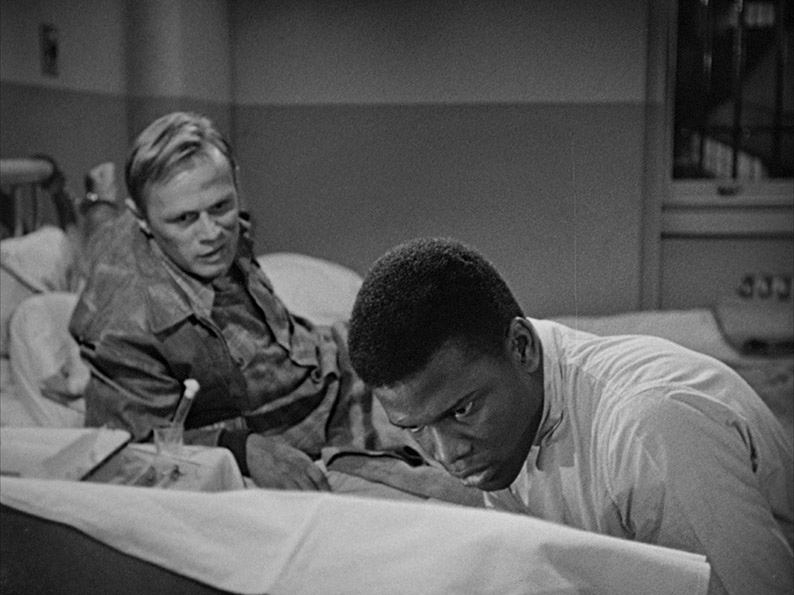
What happens next is subtly telling. Instead on engaging in a heated argument with Ray or storming out in anger, Luther simply continues with his work, deflecting or simply ignoring Ray's abuse and focussing his attention on treating his brother. When he observes that Johnny is not responding to what should be an extreme pain stimulus, his urgency increases and he quickly concludes that he is suffering from a brain tumour, the symptoms of which he hopes to relieve with a spinal tap. When Johnny dies during the procedure, the furious Ray is convinced that he was murdered by Luther in retaliation for Ray's racist insults, and refuses to grant permission for the autopsy that Luther believes will confirm his diagnosis.
As anyone who has read any of my previous reviews of films in which racism is a central issue will doubtless be aware, I have nothing by contempt for racist attitudes and the people who propagate them. And while I'm tempted to suggest that I've said my piece on the subject and direct you instead to one of those articles (try my coverage of Sam Fuller's White Dog if you want to dive in head-first), current world circumstances require that all people of conscience speak up against this most poisonous form of wilful stupidity at every opportunity. It's a worrying fact that right-wing extremism is on the rise again, seemingly emboldened by the outspoken stupidity of America's Racist-in-Chief and those detestable liars who spearheaded our departure from the European Union. Such politics and racism go hand-in-hand, and I find myself once again wondering how much of a troglodyte you have to be to despise someone you've never met and know nothing about simply because they look a little different to you or their first language is not the same as the one that you were brought up with? Perhaps the most ridiculous notion of all is that of so-called white supremacy, a comically absurd term inspired by a skin pigment that isn't white at all but a subtle shade of pink. Pink supremacy. Doesn't sound quite so tough, does it ladies?
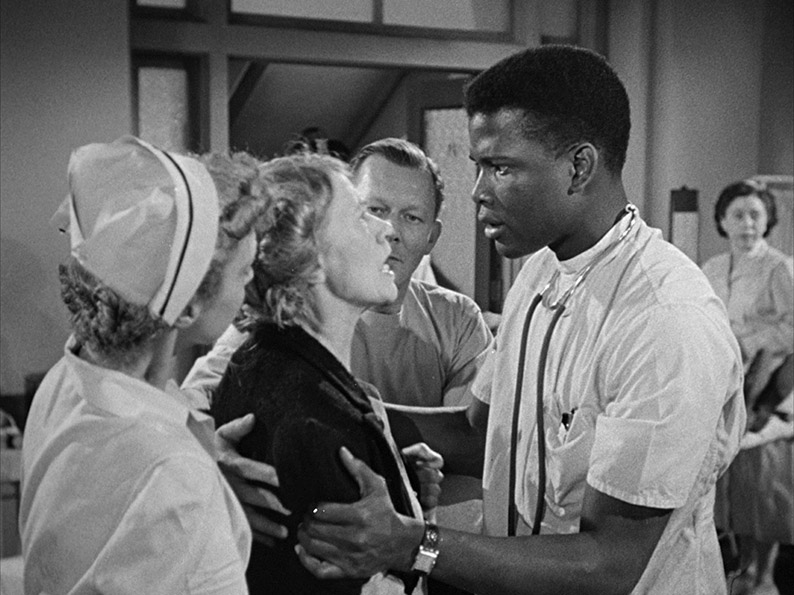
The toxic nature of racism was confronted head-on by several key American films of the 1950s and (especially) 1960s, a number of which – not coincidentally, I'm sure – co-starred the redoubtable Sidney Poitier. Think Richard Brooks' The Blackboard Jungle (1955), Stanley Kramer's The Defiant Ones (1958) and Guess Who's Coming to Dinner (1967) and Norman Jewison's In the Heat of the Night (1967), three of which have been reviewed for the site by Camus, who is as passionately anti-racist as I am, but a little more eloquent in his arguments. No Way Out not only pre-dates the first of those films by five years, but was Sidney Poitier's first credited film role and a (co-) starring one at that. It pulls no punches, and if you're expecting me to then qualify that by adding, "for a film made back in 1950" then you're in for a long and fruitless wait. The racist attitudes and language here are as direct and unpleasantly confrontational as anything you'll find in modern American cinema, and to be honest feel even more shocking for being in a film made at a time when the Production Code still held sway and what tends to be classified as strong language was not just off-limits, but a good many years from its American screen debut.
All of which makes the film uncomfortable viewing, but for all the right reasons. Ray's racism is never diluted for mass consumption, and at a time when the word "nigger" is respectfully referred to as "the n-word" by white commentators, to hear it used so frequently and with such hateful venom here is genuinely jarring, but also serves as a reminder of just how vile a word it is when wielded as a racial insult. Yet perhaps the most insidious aspect of Ray's racism – and this is so relevant to today – is how easily he is able to use it to poison others. This is vividly illustrated when, after Ray's refusal to allow an autopsy, Luther and his mentor, Dan Wharton (Stephen McNally), approach Johnny's ex-wife Edie to seek her blessing instead. But Edie seems nonplussed by her ex-husband's death and clearly detests Ray, and consequently shows no interest in helping them out. But after they depart, she begins to have doubts, and heads to the hospital to pay Ray a visit. At first, her open contempt for Ray, with whom she once had an affair, is on full display, but over the course of the next few minutes she is gradually worn down by the ferocity and unwavering conviction of Ray's hatred. By the time she leaves, she is equally convinced of Luther's guilt and willing to trigger destructive action on Ray's behalf against not just Luther, but the entire black community, a region of the city that Ray sneeringly describes as "Nigger Town."
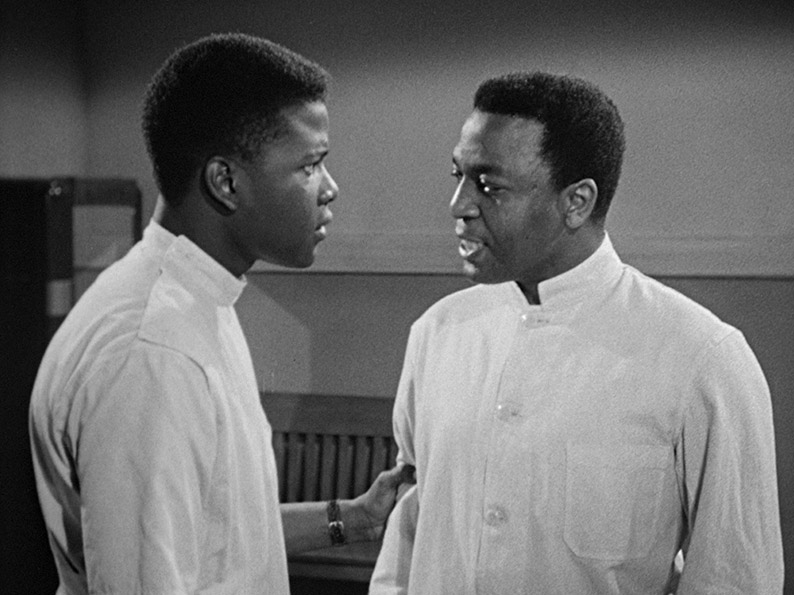
But it's not just those who are sympathetic to Ray's viewpoint who are ultimately infected by its poison, as illustrated by black elevator operator Lefty Jones (Dots Johnson), whose anger at the way people of colour are treated by whites has evolved into a prejudice of its own. When he learns that a group of white racists is planning to attack the black district on Ray's instruction, he and his fellow community members respond by taking the fight to the white aggressors, in the process triggering a localised but violent race riot. It's in Edie's eventual willingness to consider the opposing arguments that hope for change lies, as she quickly begins to doubt the wisdom of her decision to relay Ray's instructions, then has Ray's hateful programming soundly undermined and eventually diffused by Dan's level-headed black housekeeper Gladys (an uncredited and quietly terrific Amanda Randolph). Although this seems to occur in the blink of an edit, there's something satisfyingly persuasive about the idea that Gladys is able to get through to Edie simply by brushing off the previous evening's drunken hostility and conversing with her on equal terms at the breakfast table, where the two women share stories and viewpoints like two close friends who have known each other for years.
Events take a further dark turn in the later stages, where Ray's mania builds to a terrifying peak and puts the lives of both Edie and Luther at palpable risk. There are some neatly thought-out-out plot twists on the way, one of which provides Luther with a last ditch shot at potentially clearing his name (and by not showing the procedure during which Johnny died, the possibility that Luther might have actually made a mistake is always on the table), while another allows Edie to inventively turn Ray's loyal older brother George's deafness to her advantage.
Some may have some words of criticism for Richard Widmark's performance as Ray, whom he portrays as a scheming and sneering ball of angry hate, but having been confronted on several unpleasant occasions by such people, for me his furious outbursts and constant mud-slinging ring frighteningly true. Indeed, so horribly convincing is he in this role that it was with no small sense of relief that I learned that he initially resisted taking it on, and that after each outburst apparently would profusely apologise to Poitier, who eventually cut this short by reminding him that they were both actors. And he's perfectly counterbalanced here by Poitier, whose magnetism, defiance and strength of character are as strong here as they are in his later electrifying turn as Virgil Tibbs in the equally confrontational In the Heat of the Night. And yes, that's a young and uncredited Ossie Davis making his screen debut as Luther's studious son John.
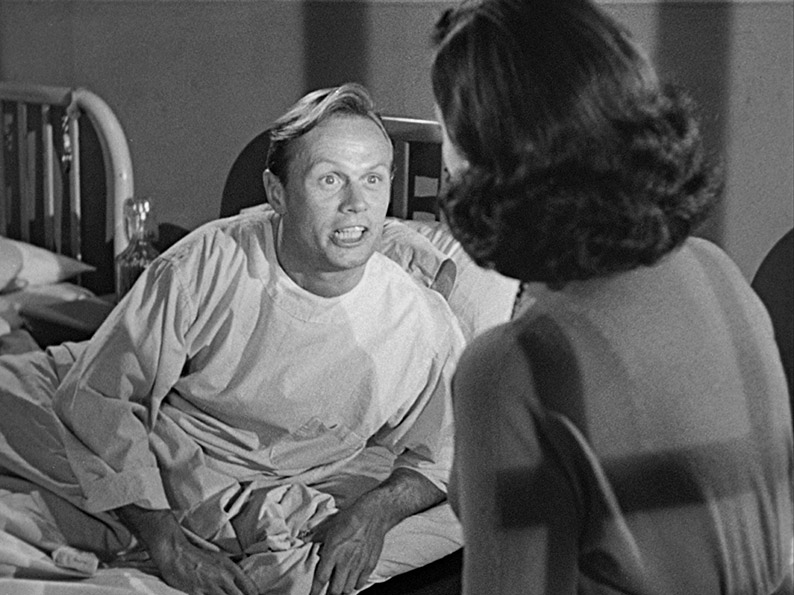
Although its impact comes from its more confrontational scenes, one of the real strengths of No Way Out is that it acknowledges the difficulties and prejudice faced by people of colour in all walks of American life. This is evident not just in Ray's irrational hatred and abuse, but also in many of the offhand moments and quieter scenes, including a telling conversation between Dan and hospital head Sam Moreland (Stanley Ridges). In bonding us so effectively with Luther, the film also forces us to confront how we would feel if we were put in his place, where after years of study and hard work he still has to contend with the sort of abuse and judgemental attitudes that none of his white colleagues would ever encounter. And it's the knowledge that these irrational, ignorant and hate-driven people are still out there and still loudly hurling abuse and worse at people who have never wronged them in any way that gives this extraordinary film a disturbingly modern edge. It's not remotely comfortable viewing and rightly so, and has sat under the radar for so many years primarily because precious few TV companies would be prepared to screen a work with such incendiary language, without which – a tad ironically – the film's power would be seriously neutered. Remarkable for its performances, its no-punches-pulled direction and an intelligent and confrontational script by Lesser Samuels (who the following year would co-write the brilliant Ace in the Hole for Billy Wilder) and director Joseph Mankiewicz, it's a film that genuinely belies its age, and one that left me shaken and fearful for a world in which such dangerous stupidity not only persists, but now seems to have a Presidential seal of approval.
The 1.33:1 1080p transfer here is robust rather than standard-setting. The sharpness and detail are good, if a few notches shy of reference quality, but the contrast range is well pitched, producing strong black levels without swallowing shadow detail and avoiding burn-outs on the highlights. The film grain is clearly evident, but in a good way, and the image is clean of dust and dirt.
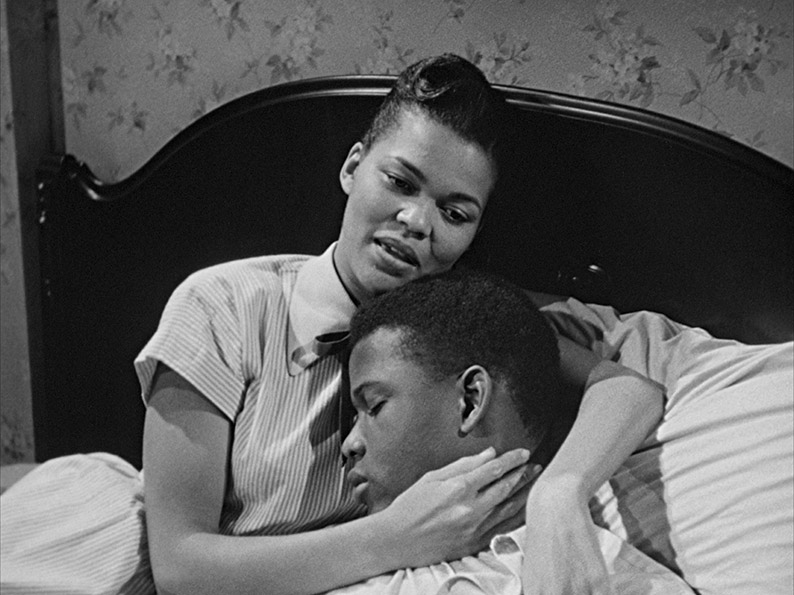
The Linear PCM 2.0 mono soundtrack inevitably lacks the bass response of a more modern work but is always clear and is devoid of the sort of crispy trebles you'll find on many films of this vintage. Again, there is no trace of damage or wear.
Optional English subtitles for the deaf and hearing impaired are provided.
Commentary by Eddie Muller
Licensed from the 2006 Fox DVD, this commentary by film noir historian and writer Eddie Muller is an excellent inclusion that covers a lot of ground in informative detail, with revealing information on the making of the film and the actors and filmmakers, and some thoughtful analysis of the film's multi-faceted portrayal of racism and the writing and handling of individual scenes. Muller praises sequences he admires but has no problem dismissing others that he thinks are below par (I actually thought he was a little harsh at times), and has a nice story about the reaction of Poitier's parents to what was their very first film viewing. He makes a strong case for categorising this as a film noir and provides details of the originally proposed ending, which would have made this one of the darkest ever films about racism ever to come out of America.
All About Mankiewicz (53:53 and 52:52)
Split into two parts, this documentary by Luc Béraud was broadcast on French television in 1983 and consists of a series of conversations conducted with Mankiewicz by Michel Ciment. The tone is a lot more easy-going than in Billy, How Did You Do It?,Volker Schlöndorff's riveting 3-hour chat with Billy Wilder (you can find this on Eureka's Blu-ray of Wilder's The Lost Weekend) and to be honest this is not as revealing or entertaining. But once you settle into the documentary's unhurried groove, Mankiewicz still has some interesting stories and a few amusingly barbed comments about some of his contemporaries. His journey into screenwriting and eventually direction is covered in some detail, but my favourite stories come in Part 2, when he describes Josef von Sternberg as a poser with talent, recalls that something said by Ernst Lubitsch was "a very Lubitschian comment, with the emphasis on bitch," and remembers W.C. Fields as a dreadful person that he nonetheless admired, despite his racism. He also delivers a hilarious allegory about the role of a producer.
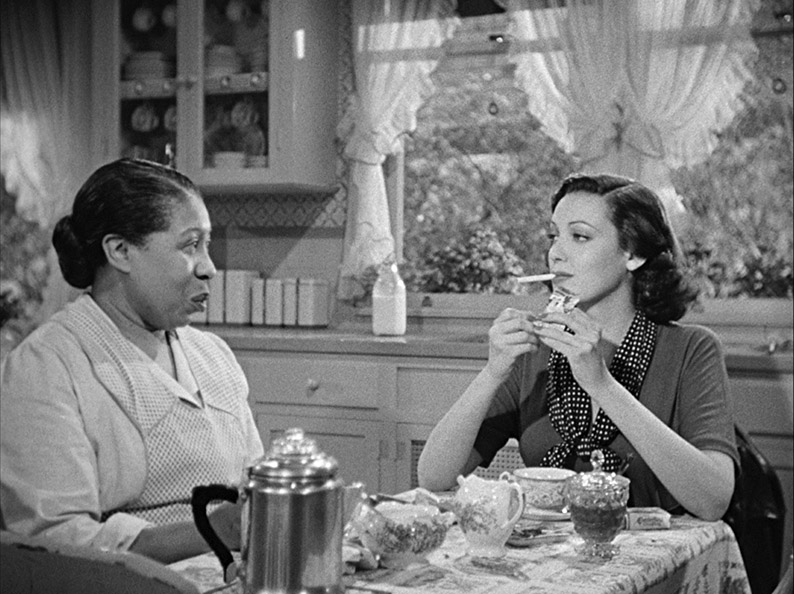
Fox Movietone Newsreels (0:59)
Two brief segments (whose combined running time is just shy of one minute) from Movietone newsreels, the first featuring Linda Darnell selling tickets at the world premiere of No Way Out, while the second is a blink-and-you'll-miss-it record of Richard Widmark adding his handprints to the Hollywood Walk of Fame.
Original Theatrical Trailer (2:35)
Racial conflict and bigoty don't get a mention in a trailer that pushes Richard Widmark and Linda Darnell as the leads (which, if you go by the billing, they technically are) and assures us that the film features "Seven new conceptions of dramatic portrayal which are the envy of the acting profession." I genuinely don't know what that means.
Also included with the release disc is a Booklet with a new essay on the film by Glenn Kenny, but this was not available for review.
One of the most confrontational and incisive films about racism in America remains criminally unseen, thanks in no small part to the reluctance of mainstream TV channels to screen it. So hats off to Eureka, who released the film on Dual Format on the very same day as The Defiant Ones, another impressive, albeit more widely seen cinematic exploration of this still thorny issue. And while The Defiant Ones was a regular Eureka release, No Way Out has received the full Masters of Cinema treatment, with the film accompanied by a fine audio commentary, a near 3-hour documentary on the director, and more. A terrific film on an excellent disc – just don't expect to come through it unscathed. Highly recommended.
|